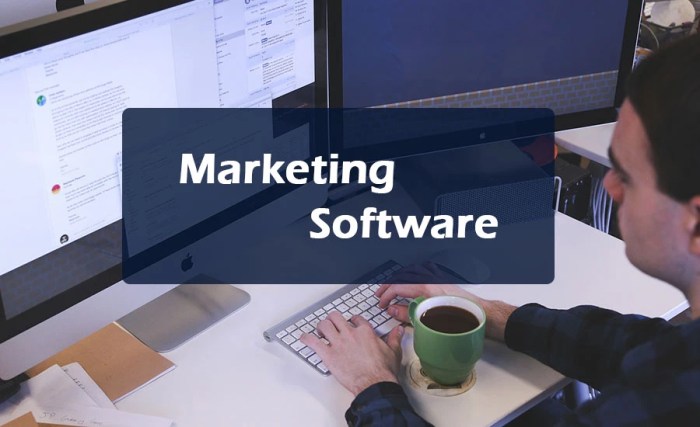Sales and marketing software for small business offers a powerful blend of tools designed to streamline operations and boost growth. From managing customer relationships and automating marketing campaigns to analyzing sales data and tracking key performance indicators (KPIs), these integrated solutions provide invaluable support for businesses of all sizes. Effective use of such software can lead to increased efficiency, improved customer engagement, and ultimately, higher profits.

Source: unionsquaredesign.com
This exploration delves into the benefits and considerations of implementing these crucial tools.
Choosing the right software involves careful consideration of your business needs, budget, and technical capabilities. Factors such as ease of use, scalability, integration with existing systems, and the availability of customer support are all crucial elements to evaluate. Different software packages offer varying features, from basic contact management to sophisticated analytics dashboards and automated email marketing. Understanding these differences is key to making an informed decision.
In today’s competitive landscape, small businesses need every advantage they can get. Effective sales and marketing are crucial for growth, but managing these functions can feel overwhelming without the right tools. This comprehensive guide explores the world of sales and marketing software designed specifically for small businesses, helping you choose the perfect solution to streamline your operations and boost your bottom line.
We’ll delve into various software categories, key features, pricing considerations, and frequently asked questions to empower you to make an informed decision.
Understanding Your Needs: Identifying the Right Sales and Marketing Software: Sales And Marketing Software For Small Business
Before diving into specific software options, it’s crucial to assess your business’s unique needs. Consider the following questions:
- What are your primary marketing goals? (e.g., lead generation, brand awareness, customer retention)
- What is your current sales process? (e.g., inbound, outbound, a mix of both)
- What is your budget? Software pricing varies significantly.
- What is your technical expertise? Some software requires more technical knowledge than others.
- What is the size of your team? Choose software that scales with your growth.
Types of Sales and Marketing Software for Small Businesses
The market offers a diverse range of software catering to various aspects of sales and marketing. Here are some key categories:
1. Customer Relationship Management (CRM) Software
A CRM is the backbone of many sales and marketing operations. It centralizes customer data, tracks interactions, manages leads, and automates tasks. Popular options for small businesses include:
- HubSpot CRM: A free and powerful option with excellent features for small businesses. It integrates well with other HubSpot tools.
- Zoho CRM: A comprehensive and affordable CRM with a wide range of features and integrations.
- Salesforce Sales Cloud (Essentials): While Salesforce is known for its enterprise-level solutions, its Essentials plan is designed for smaller businesses and offers core CRM functionalities.
s: CRM software, customer relationship management, lead management, contact management, sales automation
2. Marketing Automation Software
Marketing automation streamlines repetitive tasks, allowing you to nurture leads, personalize communication, and track campaign performance. Examples include:
- HubSpot Marketing Hub: Integrates seamlessly with HubSpot CRM, offering email marketing, social media management, landing page creation, and more.
- Mailchimp: A user-friendly email marketing platform ideal for smaller businesses with robust automation features.
- ActiveCampaign: A powerful marketing automation platform with advanced features like predictive analytics and segmentation.
s: marketing automation, email marketing, lead nurturing, campaign management, marketing analytics
3. Email Marketing Software
Email remains a powerful marketing channel. Dedicated email marketing platforms offer features like list segmentation, automated email sequences, and performance tracking.
- Constant Contact: Easy-to-use platform with strong email design capabilities.
- GetResponse: Offers a wide range of features including webinars and landing pages.
s: email marketing software, email campaigns, email automation, email list management
4. Social Media Management Software, Sales and marketing software for small business
Managing multiple social media accounts can be time-consuming. Social media management tools help schedule posts, track engagement, and analyze performance.
- Hootsuite: A popular platform for managing multiple social media accounts from a single dashboard.
- Buffer: Known for its ease of use and scheduling capabilities.
s: social media management, social media scheduling, social media analytics, social media marketing
5. Website Analytics Software
Understanding your website’s performance is essential for optimizing your marketing efforts. Website analytics tools provide valuable insights into website traffic, user behavior, and conversion rates.
- Google Analytics: A free and powerful tool offering comprehensive website analytics.
s: website analytics, Google Analytics, web traffic analysis, user behavior analysis, conversion rate optimization
Choosing the Right Software: Factors to Consider
Selecting the right software involves careful consideration of several factors:
- Ease of use: Choose software that is intuitive and easy for your team to learn and use.
- Integrations: Ensure the software integrates with other tools you use (e.g., accounting software, e-commerce platform).
- Scalability: Select software that can grow with your business.
- Customer support: Look for software providers with responsive and helpful customer support.
- Pricing: Compare pricing plans and features to find the best value for your budget.
Frequently Asked Questions (FAQ)
- Q: How much does sales and marketing software cost? A: Pricing varies widely depending on the software, features, and number of users. Some offer free plans, while others charge monthly or annual subscriptions.
- Q: Can I use multiple software solutions together? A: Yes, many businesses use a combination of different software tools to manage their sales and marketing efforts. Integration between these tools is key for efficiency.
- Q: What are the key performance indicators (KPIs) to track? A: KPIs vary depending on your goals, but common ones include website traffic, lead generation, conversion rates, customer acquisition cost (CAC), and customer lifetime value (CLTV).
- Q: How can I ensure data security with sales and marketing software? A: Choose reputable providers with robust security measures, and always follow best practices for data protection.
- Q: Do I need a technical expert to implement sales and marketing software? A: The level of technical expertise required depends on the software. Many user-friendly options require minimal technical knowledge.
Conclusion: Empowering Your Small Business with the Right Tools
Investing in the right sales and marketing software is a crucial step in growing your small business. By carefully assessing your needs, exploring different software options, and considering the factors Artikeld above, you can find the perfect tools to streamline your operations, boost your efficiency, and ultimately achieve your business goals. Remember to start small, focus on your key priorities, and scale your software usage as your business grows.
References:
- HubSpot
- Zoho
- Salesforce
- Mailchimp
- ActiveCampaign
- Constant Contact
- GetResponse
- Hootsuite
- Buffer
- Google Analytics
Call to Action: Find the Perfect Software for Your Business Today!
Start your free trial or explore the features of the software mentioned above. Take the first step towards optimizing your sales and marketing efforts and achieving sustainable growth.
Ultimately, the decision to invest in sales and marketing software for your small business is a strategic one that can significantly impact your success. By carefully assessing your needs and selecting the right tools, you can leverage technology to optimize your operations, improve customer relationships, and drive sustainable growth. The benefits extend beyond simply automating tasks; they empower you to make data-driven decisions, personalize your marketing efforts, and ultimately, build a more profitable and resilient business.
Question Bank
What are the common features of sales and marketing software for small businesses?
Common features include CRM (Customer Relationship Management), email marketing, social media management, marketing automation, sales pipeline management, and reporting/analytics dashboards.
How much does sales and marketing software typically cost?
Pricing varies widely depending on the features, scalability, and vendor. Options range from free plans with limited functionality to enterprise-level solutions with monthly or annual subscription fees.
What is the best sales and marketing software for a small business?
There’s no single “best” software. The ideal choice depends on your specific needs and budget. Research different options and compare features before making a decision.
How long does it take to implement sales and marketing software?

Source: tweakyourbiz.com
Implementation time varies depending on the complexity of the software and your existing systems. Some solutions are quick to set up, while others may require more extensive configuration and training.
Do I need technical expertise to use sales and marketing software?
Many solutions are designed to be user-friendly, requiring minimal technical expertise. However, more advanced features might require some training or support.